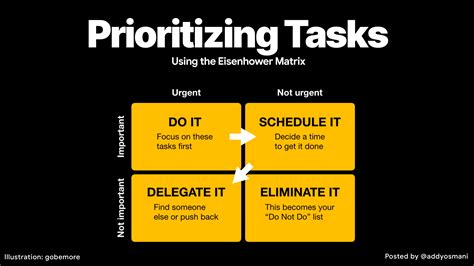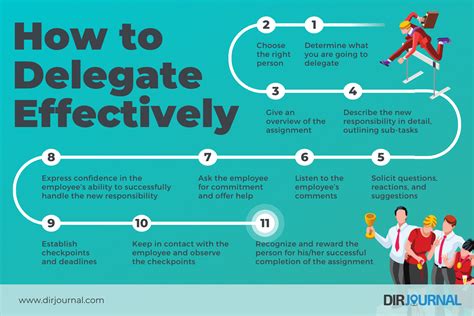Are you tired of constantly feeling overwhelmed by the never-ending to-do list that seems to consume your time and energy? It's time to take control of your schedule and boost your productivity by implementing effective time management techniques. Time is a precious resource, and learning how to manage it wisely is the key to achieving success in both your personal and professional life.
Don't let your days slip away without making progress toward your goals. With the right strategies and mindset, you can accomplish more in less time while minimizing the stress and anxiety that often accompany a bustling schedule. By allocating your time efficiently, you can create a harmonious balance between work and leisure, allowing you to fully embrace each moment and make the most of your precious hours.
Through the art of time management, you can optimize your focus, prioritize tasks effectively, and eliminate unnecessary distractions that hinder your productivity. By identifying your most productive periods and leveraging your strengths, you can harness your full potential and accomplish tasks with ease. Additionally, by incorporating tools and techniques that streamline your workflow, you can maximize your output and achieve a sense of accomplishment.
As you navigate the fast-paced demands of modern life, it's crucial to remember that time is a finite resource. By learning how to manage it effectively, you can not only enhance your productivity but also create space for personal growth, self-care, and pursuing your passions. So, why wait? Dive into the world of efficient time utilization strategies and unlock your full potential today!
Prioritizing Tasks for Optimal Time Management

In this section, we will explore the importance of organizing and prioritizing tasks to make the most efficient use of your time, enhance your productivity, and achieve your goals effectively. By understanding the significance of prioritization, you can make informed decisions about which tasks to focus on first, ensuring that you allocate your time and energy wisely.
When it comes to managing your time effectively, prioritizing tasks is essential. Prioritization involves assessing the importance, urgency, and significance of each task on your to-do list. By assigning a priority level to each task, you can determine which tasks require immediate attention and which can be delayed or delegated.
- Identify deadlines: Start by identifying tasks with specific deadlines or time constraints. These tasks should be prioritized accordingly to ensure they are completed on time and don't cause unnecessary stress.
- Evaluate importance: Consider the impact and significance of each task in relation to your overall goals and objectives. Prioritize tasks that contribute directly to your long-term success or have a high level of importance in your current situation.
- Assess urgency: Some tasks may be equally important but have different levels of urgency. Evaluate the time sensitivity of each task and prioritize accordingly to prevent any last-minute rush or missed deadlines.
- Consider effort and impact: Assess the effort required to complete each task and the potential impact it would have on your overall productivity or desired outcomes. Prioritize tasks that have a significant impact but require less effort to complete.
- Break down complex tasks: If you have complex tasks on your list, consider breaking them down into smaller, manageable sub-tasks. This will help you prioritize the individual steps, ensuring progress is made towards completing the larger task.
- Revisit and adjust: Regularly review and adjust your task priorities as circumstances change. Flexibility is key to effective time management, as new tasks may arise or priorities may shift.
By prioritizing tasks in a strategic manner, you can focus your time and energy on what truly matters, ensuring that you are maximizing your productivity and moving closer to achieving your goals. Prioritization is a crucial skill for effective time management and can help you maintain control over your workload, reduce stress, and achieve a sense of accomplishment.
Set Clear Objectives
In order to effectively manage your time and enhance your productivity, it is essential to establish clear and specific goals. Setting clear objectives provides a sense of direction and purpose, guiding your actions and prioritizing your tasks. By defining what you want to achieve, you can focus your time and energy on the most important activities, ensuring that you are working towards your desired outcomes.
When setting clear goals, it is important to be specific and measurable. Instead of setting a vague goal such as "improve productivity," set a specific objective such as "increase productivity by 20% by the end of the month." This provides clarity and enables you to track your progress effectively. Additionally, break down your goals into smaller, actionable steps that can be easily accomplished. This will help you stay motivated and prevent overwhelm.
| Advantages of Setting Clear Goals |
| 1. Enhanced Focus |
| Setting clear goals helps you concentrate on the most important tasks and avoid distractions. It creates a clear path for your actions, enabling you to stay focused and productive. |
| 2. Improved Decision-Making |
| Having clear goals provides a framework for making decisions. When faced with choices, you can evaluate them based on whether they align with your objectives, making it easier to prioritize and make informed choices. |
| 3. Increased Motivation |
| Clear goals provide a sense of purpose and direction, increasing your motivation to work towards achieving them. As you make progress and see results, your motivation and commitment will continue to grow. |
Remember to regularly review and reassess your goals to ensure they remain relevant and aligned with your overall objectives. Clear goals serve as signposts that keep you on track and propel you towards greater productivity and success.
Create a Schedule

One essential aspect of managing your time effectively and increasing your productivity is to establish and follow a well-structured schedule. By creating a schedule, you allocate specific time slots for the tasks and activities that you need to accomplish, allowing you to prioritize and organize your day efficiently.
A schedule serves as a roadmap for your day, guiding you through your tasks and ensuring that you allocate sufficient time for each one. It helps you avoid wasting time on unimportant activities and allows you to focus on the tasks that truly matter. By planning your day in advance, you can effectively manage your time and make the most of every hour.
To create a schedule that works for you, start by identifying your most important and time-consuming tasks. Consider the deadlines and priorities associated with each task, and allocate dedicated time slots accordingly. Be realistic with your time allocations and ensure that you allow adequate time for breaks and relaxation to prevent burnout.
| Task | Time Slot |
|---|---|
| Project A | 9:00 AM - 11:00 AM |
| Meeting with Team | 11:30 AM - 12:30 PM |
| Lunch Break | 12:30 PM - 1:30 PM |
| Emails and Communication | 1:30 PM - 2:30 PM |
| Project B | 2:30 PM - 5:30 PM |
Having a visual representation of your schedule, such as in the table above, can help you better understand and manage your time commitments. It allows you to see how your day is structured and identify any potential conflicts or gaps in your schedule.
Remember, flexibility is key when creating a schedule. Unexpected events or urgent tasks may arise, requiring adjustments to your planned time slots. It is essential to be adaptable and make necessary changes to your schedule while still prioritizing your most important tasks.
By consistently following a well-designed schedule, you can optimize your time management, increase your efficiency, and ultimately boost your productivity levels. Take control of your time by creating a schedule that works for you, and reap the benefits it brings to your daily life and work.
Avoiding Delay
In order to enhance efficiency and accomplish more in a given timeframe, it is crucial to evade the tendency for postponement. This behavior refers to the act of delaying or deferring tasks, resulting in unnecessary time wastage and decreased productivity. By making a conscious effort to overcome procrastination, individuals can optimize their time management skills and accomplish their goals more effectively.
One effective method to avoid procrastination is by setting clear and realistic objectives. By establishing specific and achievable goals, individuals can reduce the likelihood of feeling overwhelmed and thereby decrease the inclination to delay tasks. Additionally, breaking down larger objectives into smaller, more manageable tasks can make them seem less daunting and encourage immediate action.
Moreover, prioritizing tasks based on their level of urgency or importance is another effective strategy to combat procrastination. By creating a prioritized to-do list, individuals can focus their attention on the most crucial tasks first, ensuring they are completed in a timely manner. This approach not only enhances efficiency but also helps to avoid the unnecessary accumulation of tasks, which often leads to procrastination.
Avoiding distractions is also essential to prevent procrastination. In today's highly connected world, it is easy to become sidetracked by social media, emails, or irrelevant tasks. By eliminating or minimizing distractions, such as turning off notifications or allocating specific time slots for checking messages, individuals can maintain focus and increase their productivity.
Furthermore, it is important to address any underlying causes of procrastination, such as fear of failure or perfectionism. Identifying and understanding the root causes can help individuals develop strategies to overcome these obstacles and cultivate a proactive mindset that enables them to tackle tasks promptly.
In conclusion, by consciously avoiding procrastination, individuals can significantly enhance their time management skills and boost productivity. Through the establishment of clear objectives, prioritization of tasks, elimination of distractions, and addressing underlying causes, individuals can effectively manage their time and accomplish their goals in a more efficient manner.
Delegate Responsibilities

In order to enhance efficiency and maximize output, one essential aspect of time management involves delegating responsibilities. Delegating tasks to others allows for a more effective distribution of workload, enabling individuals to focus on their core strengths and responsibilities. This not only frees up valuable time, but also fosters collaboration and promotes a sense of shared ownership within a team or organization.
Empowering Others
By delegating responsibilities, individuals can empower others by providing them with opportunities to learn and grow. Delegation allows for the development of skills and expertise among team members, while fostering a sense of trust and confidence. By entrusting tasks to others, individuals not only elevate their own productivity but also support the professional development of their colleagues.
Effective Communication
In order to delegate responsibilities successfully, effective communication is crucial. Clear and concise instructions, accompanied by necessary resources and guidelines, ensure that delegated tasks are carried out efficiently. Regular check-ins and feedback loops maintain accountability and provide opportunities for clarification or adjustments throughout the delegated process.
Identifying Strengths
Delegating responsibilities also involves recognizing individual strengths and expertise within a team. By matching tasks with those who possess the right skills and knowledge, individuals can ensure that tasks are completed effectively and to a high standard. This strategic allocation of responsibilities maximizes productivity and achieves optimal outcomes.
Monitoring Progress
While delegation is key to time management and productivity, it is equally important to monitor the progress of delegated tasks. Regular follow-ups and updates allow individuals to identify any potential delays or obstacles, enabling timely interventions to ensure successful completion. This proactive approach to monitoring progress ensures that delegated responsibilities align with overall time management objectives.
Shared Responsibility
Delegating responsibilities promotes a culture of shared responsibility. By recognizing the strengths and skills of others and distributing tasks accordingly, individuals contribute to a collaborative environment where success is shared. This sense of shared ownership fosters teamwork, boosts morale, and ultimately enhances productivity within an organization.
Minimize Distractions
Enhancing focus and eliminating disruptions are essential elements in improving time management and increasing overall productivity. In this section, we will explore various strategies to minimize distractions and optimize your workflow.
1. Create a Distraction-Free Environment: Establishing a dedicated workspace that is free from distractions can significantly improve your ability to concentrate on tasks at hand. Designate an area or room with minimal noise, comfortable furniture, and minimal visual distractions. This will help create a conducive environment for enhanced focus and productivity.
2. Manage Digital Distractions: With the prevalence of technology in our lives, it is crucial to manage digital distractions effectively. Minimize the use of social media platforms, email notifications, and unnecessary phone apps during work hours. Consider utilizing productivity apps or browser extensions that block specific websites or limit screen time to keep your focus intact.
3. Prioritize and Schedule Tasks: A well-organized task list can help you prioritize and allocate time efficiently. Identify your most important and urgent tasks and allocate specific time slots to work on them. By having a clear plan, you can minimize the risk of getting distracted by less important tasks and increase your overall productivity.
4. Practice Time Blocking: Time blocking involves dedicating specific time intervals to specific tasks or activities. By scheduling blocks of uninterrupted time for focused work, you can minimize distractions and increase your concentration. Ensure that others are aware of your time blocks to minimize interruptions and preserve your focus.
5. Set Boundaries: Establishing boundaries with colleagues, family members, or roommates can help minimize interruptions. Clearly communicate your working hours and inform others about your need for uninterrupted time. Setting these boundaries will reduce distractions and allow you to focus on your tasks effectively.
6. Use Noise-Canceling Techniques: If noise is a significant distraction in your environment, consider using noise-canceling headphones or playing background white noise or calming music. These techniques can help drown out external disturbances and create a more serene environment conducive to deep concentration.
7. Take Regular Breaks: While it may seem counterintuitive, taking regular breaks can actually enhance productivity. Use short breaks to relax your mind, stretch your body, or take a brief walk. By giving yourself time to recharge, you can reduce mental fatigue and minimize the impact of distractions.
By implementing these strategies to minimize distractions, you can reclaim control over your time, optimize your focus, and boost your overall productivity.
Take Regular Breaks

In order to optimize your efficiency and maintain a high level of productivity, it is crucial to incorporate regular breaks into your daily routine. Taking scheduled breaks throughout the day can help prevent burnout, improve focus, and enhance overall well-being.
During these breaks, it is important to engage in activities that allow your mind and body to rest and recharge. This can include stretching, going for a short walk, practicing deep breathing exercises, or engaging in mindfulness activities such as meditation or yoga. By taking the time to relax and refocus, you will be better equipped to tackle your tasks with renewed energy and clarity.
Research has shown that prolonged periods of continuous work can lead to a decline in cognitive function and productivity. By taking regular breaks, you can counteract this decline and maintain a consistent level of performance throughout the day. These breaks serve as opportunities to reset your brain and alleviate mental fatigue, allowing you to approach your work with a fresh perspective.
Avoiding the temptation to work for extended periods without breaks may initially seem counterintuitive, but it is important to recognize that breaks are not a waste of time. In fact, they are a valuable investment in your productivity. By giving yourself permission to take breaks and prioritize self-care, you can avoid burnout, increase your overall productivity, and achieve better results in your work.
| Benefits of Taking Regular Breaks |
|---|
| Prevents burnout |
| Improves focus and concentration |
| Enhances overall well-being |
| Boosts creativity and problem-solving abilities |
| Reduces stress and anxiety |
Learn to Prioritize Your Commitments
Saying no is an essential skill when it comes to effective time management. It involves understanding your priorities and making conscious choices about where to allocate your time and energy. Learning to say no allows you to focus on the tasks that truly matter to you, avoiding unnecessary distractions and maintaining productivity.
One of the keys to saying no effectively is setting clear boundaries. It's important to have a clear understanding of your own goals and priorities before committing to additional tasks or responsibilities. By doing so, you can assess whether a new commitment aligns with your values and contributes to your overall well-being.
When faced with a request or invitation, consider the impact on your time and energy. Ask yourself if taking on this commitment will help you move closer to your goals or if it will simply add unnecessary stress and overwhelm. Remember that by saying no to one thing, you are saying yes to something else – be intentional about what you choose to say yes to.
Practice effective communication skills when declining a request. Express your appreciation for being considered and explain your reasons for declining. Be honest and assertive, and avoid feeling guilty for prioritizing your own well-being and productivity.
In order to effectively manage your time and boost productivity, it is important to learn the art of saying no. By setting boundaries, assessing the impact on your time and energy, and practicing effective communication, you can prioritize your commitments and allocate your resources accordingly.
FAQ
How can I improve my time management skills?
Improving time management skills involves several strategies. Firstly, you can start by creating a to-do list or using a planner to prioritize tasks and allocate time for each activity. Additionally, you can try to minimize distractions like turning off notifications or setting specific times for checking emails and social media. It is also important to take breaks and practice relaxation techniques to ensure a healthy work-life balance.
Why is time management important for productivity?
Time management is crucial for productivity because it helps individuals effectively allocate their time to complete tasks and achieve goals. When you manage your time well, you can eliminate unnecessary activities, prioritize important tasks, and reduce procrastination. This ultimately leads to increased productivity, as you are able to dedicate focused time and energy to each task and meet deadlines efficiently.
What are some common time management mistakes to avoid?
There are several common time management mistakes that can hinder productivity. Firstly, failing to prioritize tasks can lead to spending too much time on unimportant activities. Procrastination is another common mistake, as delaying tasks often results in rushed and lower quality work. Additionally, multitasking can be counterproductive, as it leads to divided attention and decreased efficiency. Lastly, not taking breaks or neglecting self-care can lead to burnout and decreased overall productivity.
How can I deal with unexpected interruptions while managing my time effectively?
Dealing with unexpected interruptions requires flexibility and adaptation. When interruptions occur, it is important to evaluate their urgency and impact on your scheduled tasks. If possible, try to delegate or reschedule non-urgent interruptions. For urgent interruptions, communicate the need for uninterrupted time and negotiate alternative solutions. It is also helpful to build in buffer time in your schedule to account for unforeseen interruptions and maintain overall productivity.
What are effective strategies for setting and achieving goals within a given timeframe?
Setting and achieving goals within a given timeframe involves several strategies. Start by setting specific and measurable goals to provide clarity and motivation. Break down larger goals into smaller, manageable tasks to make the process more achievable. Prioritize tasks based on their importance and deadlines. Regularly review and track progress towards goals to stay on track. Finally, celebrate small milestones and reward yourself for achieving goals to maintain motivation and maintain productivity.



